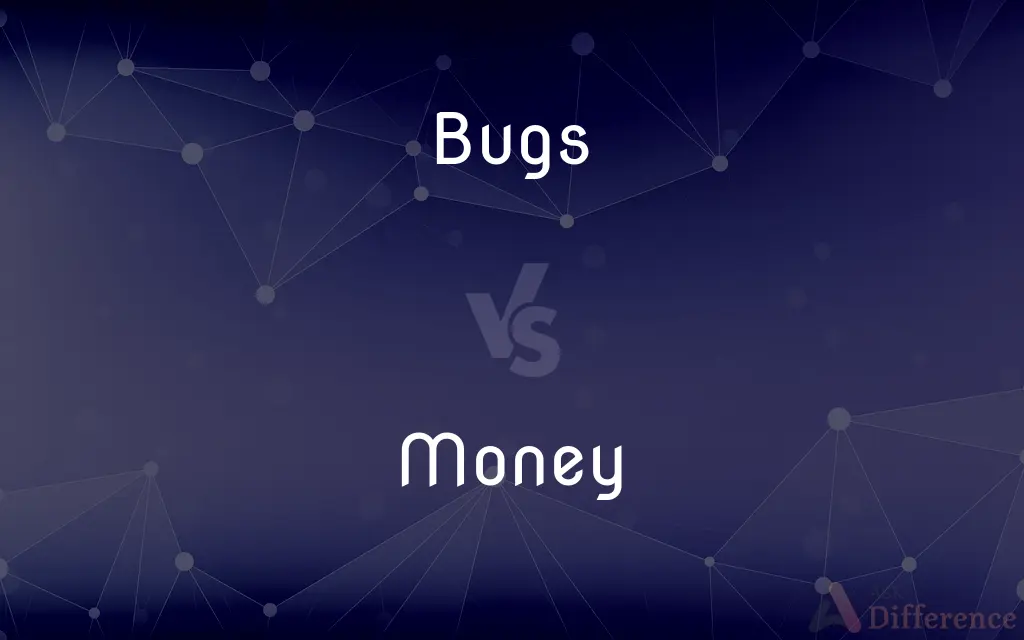Bugs vs. Money — What's the Difference?
By Tayyaba Rehman & Maham Liaqat — Updated on April 28, 2024
Bugs refer to software errors or defects, while money is a medium of exchange, store of value, and unit of account.

Difference Between Bugs and Money
Table of Contents
ADVERTISEMENT
Key Differences
Bugs are unintended flaws in software or systems that can cause errors or unexpected behaviors. On the other hand, money is any item that is generally accepted as payment for goods and services and repayment of debts.
Bugs can arise from mistakes made during the software development process. Whereas money is created and regulated by governments and financial institutions to ensure stability and promote economic activity.
The impact of bugs can be detrimental, leading to data loss, security vulnerabilities, or system failures. In contrast, money facilitates trade, supports economic policies, and influences global economies.
Finding and fixing bugs is crucial for maintaining the integrity and functionality of software systems. Conversely, managing money involves budgeting, investing, and safeguarding assets to ensure financial health.
Bugs often require technical expertise to identify and resolve, which can be a time-consuming and costly process. Meanwhile, handling money effectively requires financial literacy and can have significant implications on personal and national economic conditions.
ADVERTISEMENT
Comparison Chart
Definition
Errors in software causing unintended behavior
Medium of exchange for goods and services
Origin
Mistakes in coding or system design
Issued by governments and institutions
Impact
Can lead to system failures or data loss
Facilitates trade and economic policies
Management
Requires debugging and software updates
Involves budgeting, investing, and saving
Skill Required
Technical expertise in software development
Financial literacy and management skills
Compare with Definitions
Bugs
Error.
The latest software update contains a serious error that crashes the system.
Money
Funds.
They raised enough funds to cover all their project expenses.
Bugs
Glitch.
A small glitch in the video game caused the graphics to temporarily distort.
Money
Cash.
She prefers to pay with cash to avoid credit card fees.
Bugs
Bug.
They identified a bug that caused data corruption in the database.
Money
Capital.
The company is seeking additional capital to expand its operations.
Bugs
Fault.
The fault in the application logic prevented users from completing their transactions.
Money
Finance.
Good finance management is crucial for long-term financial stability.
Bugs
Defect.
The defect in the code was overlooked during the initial testing phase.
Money
Currency.
The US dollar is used as the official currency in several countries.
Bugs
An insect having mouthparts used for piercing and sucking, such as an aphid, a bedbug, or a stinkbug.
Money
Money is any item or verifiable record that is generally accepted as payment for goods and services and repayment of debts, such as taxes, in a particular country or socio-economic context. The main functions of money are distinguished as: a medium of exchange, a unit of account, a store of value and sometimes, a standard of deferred payment.
Bugs
An insect of any kind, such as a cockroach or a ladybug.
Money
A medium that can be exchanged for goods and services and is used as a measure of their values on the market, including among its forms a commodity such as gold, an officially issued coin or note, or a deposit in a checking account or other readily liquefiable account.
Bugs
A small invertebrate with many legs, such as a spider or a centipede.
Money
The official currency, coins, and negotiable paper notes issued by a government.
Bugs
A disease-producing microorganism or agent
A flu bug.
Money
Assets and property considered in terms of monetary value; wealth.
Bugs
The illness or disease so produced
Took several days to get over the bug.
Money
Pecuniary profit or loss
He made money on the sale of his properties.
Bugs
A defect or difficulty, as in a system or design.
Money
One's salary; pay
It was a terrible job, but the money was good.
Bugs
(Computers)A defect in the code or routine of a program.
Money
An amount of cash or credit
Raised the money for the new playground.
Bugs
An enthusiasm or obsession
Got bitten by the writing bug.
Money
Often moneys, monies Sums of money, especially of a specified nature
State tax moneys.
Monies set aside for research and development.
Bugs
An enthusiast or devotee; a buff
A model train bug.
Money
A wealthy person, family, or group
To come from old money.
To marry into money.
Bugs
An electronic listening device, such as a hidden microphone or wiretap, used in surveillance
Planted a bug in the suspect's room.
Money
A legally or socially binding conceptual contract of entitlement to wealth, void of intrinsic value, payable for all debts and taxes, and regulated in supply.
Bugs
To grow large; bulge
My eyes bugged when I saw the mess.
Money
A generally accepted means of exchange and measure of value.
I cannot take money, that I did not work for.
Before colonial times cowry shells imported from Mauritius were used as money in Western Africa.
Bugs
To annoy; pester.
Money
A currency maintained by a state or other entity which can guarantee its value (such as a monetary union).
Money supply;
Money market
Bugs
To prey on; worry
A memory that bugged me for years.
Money
Hard cash in the form of banknotes and coins, as opposed to cheques/checks, credit cards, or credit more generally.
Bugs
To equip (a room or telephone circuit, for example) with a concealed electronic listening device.
Money
The total value of liquid assets available for an individual or other economic unit, such as cash and bank deposits.
Bugs
To make (the eyes) bulge or grow large.
Money
Wealth; a person, family or class that possesses wealth
Bugs
Plural of bug
Money
An item of value between two or more parties used for the exchange of goods or services.
Bugs
(slang) Crazy; unstable.
Money
A person who funds an operation.
Money
A piece of metal, as gold, silver, copper, etc., coined, or stamped, and issued by the sovereign authority as a medium of exchange in financial transactions between citizens and with government; also, any number of such pieces; coin.
To prevent such abuses, . . . it has been found necessary . . . to affix a public stamp upon certain quantities of such particular metals, as were in those countries commonly made use of to purchase goods. Hence the origin of coined money, and of those public offices called mints.
Money
Any written or stamped promise, certificate, or order, as a government note, a bank note, a certificate of deposit, etc., which is payable in standard coined money and is lawfully current in lieu of it; in a comprehensive sense, any currency usually and lawfully employed in buying and selling.
Money
Any article used as a medium of payment in financial transactions, such as checks drawn on checking accounts.
Money
Any form of wealth which affects a person's propensity to spend, such as checking accounts or time deposits in banks, credit accounts, letters of credit, etc. Various aggregates of money in different forms are given different names, such as M-1, the total sum of all currency in circulation plus all money in demand deposit accounts (checking accounts).
Money
In general, wealth; property; as, he has much money in land, or in stocks; to make, or lose, money.
The love of money is a root of all kinds of evil.
Money
To supply with money.
Money
The most common medium of exchange; functions as legal tender;
We tried to collect the money he owed us
Money
Wealth reckoned in terms of money;
All his money is in real estate
Money
The official currency issued by a government or national bank;
He changed his money into francs
Common Curiosities
What is a bug in software?
A bug is an error, fault, or flaw in software that causes it to produce incorrect or unexpected results.
How does money function in the economy?
Money serves as a medium of exchange, a unit of account, and a store of value, facilitating transactions and economic activity.
What are the different forms of money?
Money can take various forms, including physical currency, digital transactions, and other financial instruments.
Why are bugs problematic in software?
Bugs can lead to system failures, security breaches, and other critical issues that disrupt user experience and functionality.
How do bugs affect user trust in software?
Frequent or severe bugs can erode user trust and lead to decreased software adoption or customer churn.
What role does money play in personal finance?
Money is essential for managing expenses, savings, investments, and overall financial planning.
Can bugs be completely eliminated from software?
While it's nearly impossible to eliminate all bugs, rigorous testing and quality assurance can minimize their presence and impact.
Is digital money safe?
Digital money has robust security measures, but it requires cautious handling to avoid cyber threats.
How is digital money different from physical money?
Digital money is represented electronically, whereas physical money includes tangible currency like coins and notes.
What methods are used to fix bugs?
Bugs are typically addressed through debugging, patching, and updating software to correct errors.
What is the impact of money on global economies?
Money influences economic stability, inflation rates, and international trade.
How are bugs discovered in software?
Bugs are often discovered through user reports, developer testing, and automated software tools.
What skills are needed to manage money effectively?
Financial literacy, budgeting skills, and an understanding of investment strategies are crucial.
Can bugs lead to financial losses?
Yes, bugs can cause significant financial losses by disrupting business operations and customer transactions.
Share Your Discovery

Previous Comparison
Meekness vs. Humility
Next Comparison
Accept vs. AcknowledgeAuthor Spotlight
Written by
Tayyaba RehmanTayyaba Rehman is a distinguished writer, currently serving as a primary contributor to askdifference.com. As a researcher in semantics and etymology, Tayyaba's passion for the complexity of languages and their distinctions has found a perfect home on the platform. Tayyaba delves into the intricacies of language, distinguishing between commonly confused words and phrases, thereby providing clarity for readers worldwide.
Co-written by
Maham Liaqat













































